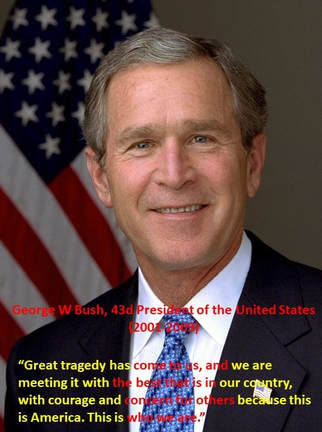
However narrow the margin of his victory, George W Bush rallied the country in the wake of the 9-11 terrorist attacks that killed over 3000 Americans when terrorists hijacked four large commercial airliners and flew them into the World Trade Center in New York City and the Pentagon in Washington, DC. The fourth plane, presumably supposed to hit the White House, crashed in a field in Pennsylvania when passengers attacked the hijackers. The attacks on the World Trade Center were particularly horrific, with many of the people trapped in the upper floors forced to choose between burning to death or jumping to their death. Many first responders were killed trying to rescue people trapped in the World Trade Center. Hundreds more Americans were killed when the third plane crashed into the Pentagon.
As details of the hijackers' preparations came to light, it was clear that this attack was planned far in advance, with the hijackers living in America for months and years before the attack, taking flight lessons in the communities where they lived, and even visiting their targets in order to program satellite navigation devices used in the attack. The source of the attack was identified as the same terrorist organization that had attacked America and American interests around the world throughout the 1990's: al Qaeda. The leadership of this terrorist organization was operating from within sanctuary provided by the Taliban regime of Afghanistan.
The United States and its allies began attacks against the Taliban regime in October, 2001, and had driven that regime from power and replaced it with a friendly regime by the end of the year. A guerilla war ensued, and the Taliban proved resilient. The war between the US backed government of Afghanistan and the Taliban continues to this day, with American forces still deployed in support of the current government.
If the War on Terror presented the Bush administration with a serious challenge, the economy also presented its share of crises. Bush took office amid a downturn attributed to the bursting of a tech bubble. The economy recovered with increased government spending accompanying the War on Terror as well as deep tax cuts, with the Dow peaking over 14,000 in 2007. Then, the Great Recession hit, sparked by the collapse of mortgage backed securities. The Dow dropped by almost 50 percent, and the economy shed 8.7 million jobs. Unemployment rose from about 4.7 percent in 2007 to about 10 percent in 2009. The Great Recession was the worst economic crisis to hit the United States since the Great Depression of the 1930's
To George W Bush goes the ironic achievement of holding both the highest public approval rating in history (in the wake of the , 9-11 attacks) as well as the lowest approval rating in history (during the Great Recession).

 RSS Feed
RSS Feed
